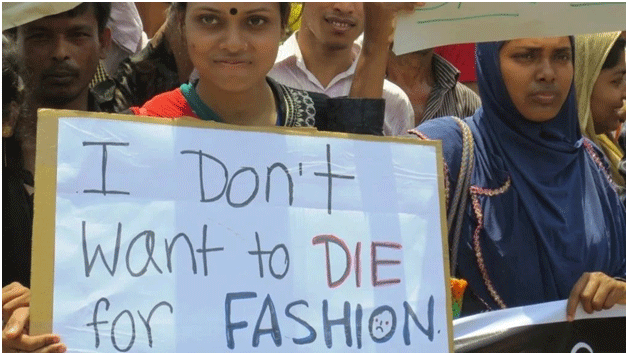Putting Water at the Heart of Sustainable Fashion

LONDON, May 20 (IPS) - Lisa Greenlee is Director of Strategic Partnerships, WaterAid.
The Copenhagen Fashion Summit celebrated its tenth anniversary last week. The summit, which is often referred to as the Davos of fashion, is a key date in the fashion diary for those businesses with a pioneering vision to highlight issues and create solutions for a more sustainable industry.
And solutions are very much needed. The global garment sector accounts for two percent of the world's GDP and has the capacity to make a huge impact both positive and negative upon environmental, economic and social issues.
Figures suggest that the fashion industry contributes more to climate change than sea and air travel due to the current throwaway clothes culture and labour rights are in many places in need of a dramatic overhaul.
In Bangladesh, for example, where the garment industry dominates the economy, many workers both live and work in inadequate conditions without any clean water to drink, a decent toilet, or somewhere to wash their hands.
WaterAid welcomes the commitment of the businesses attending the summit to ensure the positive impact of the industry which has vast potential to be a powerful force for change.
Changes which may well appear to be happening slowly but are being noticed. Much has changed across the world over the last ten years in terms of trends in the fashion industry – and not just fashion style.
There is much talk of an awakening within both business and consumers for more ethical and environmentally friendly products.
Eva Kruse, founder and CEO of Global Fashion Agenda, the organisation behind Copenhagen Fashion Summit, acknowledged that there were few industry leaders who recognised the importance of changing the way the industry produces, markets and consumes fashion at the time of the first summit; now, a decade later, more companies are beginning to integrate sustainable practices.

Business leaders and key fashion brands such as H&M and Nike took steps towards better working conditions at the World Economic Forum at Davos in January, when they signed up to the CEO Agenda 2019 which upholds human rights in the workplace.
However, the agenda omitted access to water, toilets and hygiene for workers from one of its core pillars, which is a crucial oversight. The role that these three facilities play in ensuring ‘respectful and secure working environments' is a fundamental human right – without them, any positive changes will be seriously diluted.
WaterAid attended the summit to support the trend for more sustainable fashion and promote the business value that can result from investing in and improving access to water, sanitation and hygiene for workers throughout the supply chain.
Our partners HSBC and WWF joined us as part of our combined action to support garment factories, tanneries and mills in China, India, Vietnam and Bangladesh to shift towards more sustainable production.
But still we don't have enough action and especially not enough integration between environmental and social issues in the fashion sector – ‘the only constant is change' let's get ahead of the curve and consider these issues in an integrated way.
At our stand, people were very receptive to hearing about how social and environmental issues are interlinked and why a holistic approach is the best approach.
We all have a role to play in making access to these essentials normal for everyone, everywhere by 2030, and businesses are crucial in bringing about the step change needed to meet this global challenge.
Our aim is to ensure all business, no matter what sector they are in, are aware of the value that can result for enhance productivity and business continuity from investing in water, sanitation and hygiene for both their workers and surrounding communities.
Steps recommended by WaterAid's new guide - ‘Strengthening the business case for water, sanitation and hygiene: How to measure value for your business' - are being piloted by Diageo, Gap Inc. Unilever and HSBC to assess the financial return on investment.
In June 2018, as part of the ‘Sustainable Supply Chains Programme', WaterAid and HSBC launched a new three-year project to deliver essential water and sanitation services in 24 apparel factories and the communities where the workers live in Bangladesh and India, from small artisanal workers to large-scale textile and leather factories.
In addition to improving living and working conditions for employees, the funding from HSBC will enable WaterAid to provide vital evidence about how the reliable provision of clean water, decent sanitation and hygiene is essential for the long-term sustainability of business and prove the financial return on investment.
The outcomes of this work will to encourage other companies to invest in these basics and take action in their supply chains.
In just over ten years' time the world's governments and international community will be held accountable for the meeting, or not, of the Sustainable Development goal of access to and management of clean water and sanitation for all.
WaterAid's aim is to continue to raise awareness and support of fashion industry initiatives such as the Copenhagen Fashion Summit, HSBC and all businesses to recognise the human right of access to clean water and the broader business benefits – financial and reputational – that come from providing decent facilities for their employees.
Key Stats:
- There are 4 million garment factory workers in Bangladesh, and 12 million in India.
- Women make up 80% of the workforce.
- WaterAid's HSBC-funded ‘Sustainable Supply Chains Programme' will improve the lives of approximately 11,000 people working in the garment industry in Bangladesh and India.
© Inter Press Service (2019) — All Rights ReservedOriginal source: Inter Press Service
 Global Issues
Global Issues